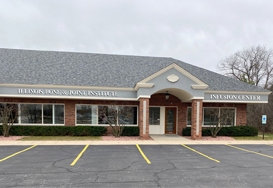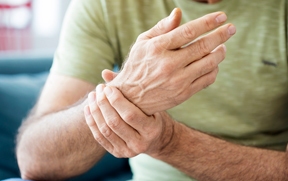What is Arthritis?
Arthritis is not a single disease; rather, it is a way of referring to joint pain or disease. In fact, there are more than 100 different types of arthritis and related conditions, with the two most common types being osteoarthritis (OA) and rheumatoid arthritis (RA). It is a very common condition; about 1 in 5 adults in the United States are affected by it.
Causes of Arthritis
The cause of your arthritis depends on the type you have. Osteoarthritis is caused by the wear and tear damage to your joint’s cartilage (the hard coating on the ends of your bones). Enough damage to your cartilage can result in your bones directly grinding on one another, causing pain and restricted movement. Rheumatoid arthritis, however, is caused by your body’s immune system attacking the lining of your joint capsule (a tough membrane that encloses all of the joint parts). The synovial membrane, or lining, then becomes inflamed and swollen, and can eventually destroy cartilage and bone within your joint.
Because your genes can make you more susceptible to environmental factors that may trigger arthritis, you may be more likely to develop certain types if they run in your family. In addition, your age and weight can put you at an increased risk for developing arthritis.
Best Treatments to Help Arthritis
Regardless of what type of arthritis you are suffering from, you don’t have to let joint discomfort and stiffness interfere on your everyday life. Depending on the type you have and your medical history, your doctor will suggest the best course of action for your body. Some of the top treatments for arthritis include:
1. Physical Therapy
An active lifestyle is essential to staying healthy, and all too often the debilitating pain of arthritis can get in the way of your active lifestyle. With physical therapy, your physical therapist will come up with a customized treatment plan that will help you reach your goals. During your physical therapy sessions, you will be doing exercises that will strengthen the muscles around your affected joint. Another common type of therapy that can help reduce your arthritis pain includes occupational therapy.
2. Medications
A variety of medications can help treat the pain and stiffness that arthritis causes. You may be prescribed pain management medications, like an analgesics or acetaminophen, or a nonsteroidal anti-inflammatory drug (NSAIDs) to help control both pain and inflammation. Sometimes, a menthol or capsaicin cream is needed to block the transmission of pain signals from your joints.
3. Surgery
Most commonly performed in the hips and knees, it is sometimes an option for patients to replace their joint with an artificial one. If you suffer from severe arthritis in your fingers or wrists, you may be a candidate for a joint fusion. In this procedure, the ends of your bones are fused together until they heal and become one.
4. Alternative Medicine
Alternative medicine can help lessen the painful symptoms you are experiencing. The most promising remedies include:
- Acupuncture: This therapy inserts fine needles are specific points on your skin to reduce pain.
- Yoga: With its slow and stretching movements, yoga can be practiced to help improve joint flexibility and range of motion.
- Massage: The light stroking and kneading of your muscles helps increase blood flow and warm certain joints, which can temporarily relieve your pain. Make sure your massage therapist knows which areas of your body are affected by arthritis.
Arthritis Treatment in Illinois
Here at Illinois Bone & Joint Institute, we proudly care for over 44,000 arthritis patients every year. Our combination of our rigorously trained physicians and the latest advancements and technology ensures that we can help you get back to enjoying life with the most comfort, mobility and functionality possible. With expert physicians and multiple locations throughout Illinois, we will happily be there for you every step of the way, from diagnosis, to treatment, to rehabilitation. For more information, please contact us today.
*This content is for information only and is not intended to replace the diagnosis, treatment, or medical advice from your treating healthcare professionals. The content does not provide medical advice, does not constitute the practice of medicine or other healthcare professional services, and does not create a doctor-patient relationship. You should not rely on this information as a substitute, nor does it replace professional medical advice, diagnosis, or treatment. If you have concerns or questions, seek the advice of your healthcare professionals. If you think you may have a medical emergency, call your doctor or 911 immediately. Do not rely on electronic communications or communicate through this website for immediate, urgent medical needs. This website is not designed to facilitate medical emergencies. The use of the information is at the reader’s own risk. The links are provided for information and convenience only. We cannot accept responsibility for the sites linked or the information found here. A link does not imply an endorsement of a site.




